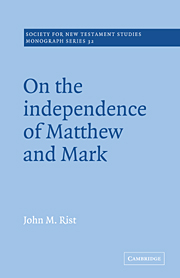Book contents
- Frontmatter
- Contents
- Author's note
- 1 Problems and assumptions
- 2 The Literary hypothesis: some preliminary tests (Mt 3:1 - 9:17)
- 3 Vocabulary and sequence: Matthew's version of Mk 2:23 - 6:13
- 4 More skimpings and bowdlerizings in Matthew
- 5 A turning point in the tradition (Mt 14:1, Mk 6:14, Lk 9:7)
- 6 Some passages about Peter in Matthew
- 7 From Caesarea Philippi to the Burial of Jesus
- 8 The end of Mark
- 9 Summary and prospects
- Appendix A M. D. Goulder on the Synoptic Problem
- Notes
- Index
4 - More skimpings and bowdlerizings in Matthew
Published online by Cambridge University Press: 10 November 2009
- Frontmatter
- Contents
- Author's note
- 1 Problems and assumptions
- 2 The Literary hypothesis: some preliminary tests (Mt 3:1 - 9:17)
- 3 Vocabulary and sequence: Matthew's version of Mk 2:23 - 6:13
- 4 More skimpings and bowdlerizings in Matthew
- 5 A turning point in the tradition (Mt 14:1, Mk 6:14, Lk 9:7)
- 6 Some passages about Peter in Matthew
- 7 From Caesarea Philippi to the Burial of Jesus
- 8 The end of Mark
- 9 Summary and prospects
- Appendix A M. D. Goulder on the Synoptic Problem
- Notes
- Index
Summary
This chapter is primarily concerned with the claim that there are a number of passages where a comparison between Mark and Matthew shows that Matthew deliberately ‘softened’ or ‘watered-down’ a text of Mark which for one reason or another he found unacceptable. In order to give opponents the benefit of the doubt where possible, I shall say nothing of the fact that those who advance this claim nowadays tend to forget the possibility that Matthew is ‘watering down’ not Mark but Mark's source. I shall, however, also touch on the broader question of those passages where Matthew's version may seem not bowdlerized, but rather an inadequate summary of a graphic and detailed Markan original. I shall attempt to show in a number of well-known instances that claims about Matthew's dependence on Mark that have been based on such ‘observation’ are exaggerated and misleading, indeed that normally no conclusions about chronological priority can be based on the evidence available. In particular I shall reject the assumption that a ‘softer’ passage is necessarily a ‘softened’ passage, and a fortiori that it is a later passage.
We have already come across some of these problems in our earlier analyses; in particular we have noted that in some parts of the Synoptics it looks as though Mark might be a summary based on Matthew, and elsewhere the converse might be the case. In fact we have argued that literary dependence cannot be assumed in such passages.
- Type
- Chapter
- Information
- On the Independence of Matthew and Mark , pp. 56 - 62Publisher: Cambridge University PressPrint publication year: 1978

